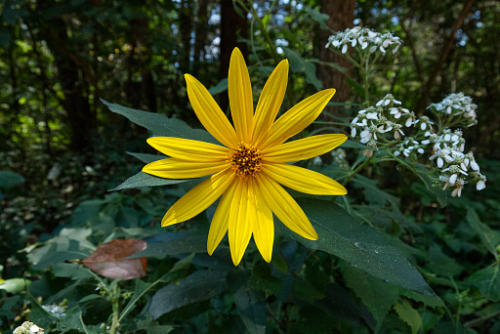
Are you tired of the same old vegetables in your garden? Want to try something new that’s easy to grow and packed with nutrients? Look no further than the Jerusalem artichoke! Also known as the sunchoke, this little-known vegetable is a member of the sunflower family and is packed with fiber, potassium, and iron. In this article, we’ll explore the fascinating history and health benefits of Jerusalem artichokes, as well as provide tips on how to grow and cook them. Keep reading to discover the many wonders of this unique and delicious vegetable.
The Jerusalem Artichoke, also called sunchoke, blooms during the late summer and into fall in the Ozarks. You may have looked at and appreciated this large yellow flowering plant without ever realizing it is a helpful plant with edible roots, called tubers.
They are native to the central US and were used by Native Americans as a food crop. Settlers learned about this valuable survival plant and sent specimens back to Europe, where it is now also used as a food crop. It became especially popular in France, where it is included as a menu item even today.
What is Jerusalem Artichoke?
This plant is neither from Jerusalem nor an artichoke. The Jerusalem artichoke is actually in the sunflower family. The flowers are large and yellow similar to the sunflowers we get seeds from. They can grow as tall as 10 feet, and most are well over 6 feet. The tubers that grow below ground are what we are interested in as the edible part of the plant.
Edible Tubers of Jerusalem Artichoke
The edible tubers can be used in the same ways you would use potatoes. In fact, they are described as being between a potato and a water chestnut. Cleaning them is the only difficult part. Because they have very thin skin it is best to leave the skin on and wash and scrub the dirt away. You shouldn’t peel them or cut off the knobs, as they are just part of the edible root.
The roots of Jerusalem artichoke are not starchy like potatoes. In fact, they contain little if any starch. They do store inulin, which can make up as much as 13% of the weight of the tuber. Inulin is a prebiotic fiber that helps the good bacteria in the digestive tract. The only caution is that as with other foods high in inulin content they may cause gas and bloating if eaten too quickly or in large amounts. This may be where the moniker “fartichoke” came from. However, much like beans, this seems to affect each individual differently, so start out slow if you decide to consume them. This is a good rule of thumb for all wild foods until you can determine how your body reacts to them.
A study published in 2011 found that they contain high amounts of fructans. Fructans are large molecules that store carbohydrates. We already discussed inulin, and this is a long-chain fructan. The short-chain fructans are called fructooligosaccharides. Fructans are non-digestible carbohydrates that are shown to affect body processes in ways that can improve health and are believed to help prevent or combat certain diseases. The study also found a higher protein and essential amino acid content than potatoes.

Where Can You Find Them?
You can forage them in the wild if you can identify them. They can be tough to dig up in the ozarks due to the rocky soil. They can also be small and thin as they grow between rocks to find water and nutrients. For this reason, many people who want the benefits of Jerusalem artichokes find it easier to take them in a supplement or purchase the tubers online.
You can find supplements online here. These supplements can contain up to 90% inulin in a capsule. This can help you get the fiber you need in your diet, as well as benefit the gut bacteria which help you digest your food and extract the nutrients your body requires from that food.
Another way to use them is to purchase the tubers and use them in the kitchen. You can also plant the tubers you purchase and after a few years, you can have your own supply of tubers you can harvest from your own garden.
How to Grow Jerusalem Artichoke
Jerusalem artichokes, also known as sunroots or sunchokes, are a type of tuber that is closely related to sunflowers. They are native to North America and were cultivated by Native Americans long before European settlers arrived. Jerusalem artichokes are a great addition to any garden, as they are easy to grow and produce a large crop of tasty and nutritious tubers.
Growing Jerusalem artichokes is relatively easy, but there are a few things to keep in mind. Here are the steps to grow Jerusalem artichokes successfully:
- Choose a sunny location: Jerusalem artichokes prefer full sun, so choose a spot in your garden that gets at least 6 hours of direct sunlight per day.
- Prepare the soil: Jerusalem artichokes grow best in loose, fertile soil that is rich in organic matter. Work compost or well-rotted manure into the soil to improve its fertility and texture.
- Plant the tubers: Jerusalem artichokes are typically planted in the spring after the danger of frost has passed. Plant the tubers about 4-6 inches deep and 12-18 inches apart. Make sure to plant the tubers with the pointy end facing up.
- Water regularly: Jerusalem artichokes require regular watering, especially during hot, dry weather. Keep the soil consistently moist, but not waterlogged.
- Mulch: Mulching around the plants can help retain moisture in the soil and keep weeds at bay.
- Harvest: Jerusalem artichokes are typically harvested in the fall after the foliage has died back. Use a digging fork to carefully lift the tubers from the soil.
One thing to keep in mind when growing Jerusalem artichokes is that they can be quite invasive. The tubers can spread quickly and easily, so it’s important to choose a location that can accommodate their spread. Alternatively, you can grow them in a large container to keep them contained.
In terms of pests and diseases, Jerusalem artichokes are relatively hardy and resistant to most common garden pests and diseases. However, they are susceptible to fungal diseases if the soil is too wet, so make sure to provide adequate drainage and avoid overwatering.
Conclusion
Jerusalem artichokes are a healthy wild food you can forage. If you prefer, you can purchase them in supplements or buy the tubers and plant your own garden to harvest. However you use them, Jerusalem artichokes are a healthy addition to your diet.
To read more articles about natural foods and health please visit our list of blog posts here.
FAQs:
Q: What is Jerusalem Artichoke?
A: Jerusalem artichoke, also known as sunchoke, is a type of root vegetable that belongs to the sunflower family. It is native to North America and has been cultivated for centuries for its edible tubers.
Q: Edible Tubers of Jerusalem Artichoke
A: The edible part of the Jerusalem artichoke is its tuber, which looks like a knobby, irregularly shaped potato. The tubers are rich in inulin, a type of carbohydrate that is not absorbed by the body, making them a great choice for people with diabetes or those on a low-carbohydrate diet. They have a slightly sweet, nutty flavor and can be eaten raw or cooked.
Q: Where Can You Find Them?
A: Jerusalem artichokes are not as widely available as other root vegetables, but you can usually find them in specialty grocery stores or farmers’ markets. They are in season from late fall to early spring and can be stored in a cool, dark place for up to a week. Alternatively, you can grow your own Jerusalem artichokes in your garden, as they are easy to cultivate and can produce a large crop.
Q: What are Jerusalem artichokes good for?
A: Jerusalem artichokes are a good source of fiber and contain vitamins and minerals such as potassium, iron, and thiamine. They are also low in calories and have a low glycemic index, which can make them beneficial for those with diabetes.
Q: Are Jerusalem artichokes anti-inflammatory?
A: Jerusalem artichokes contain inulin, a type of prebiotic fiber that has been shown to have anti-inflammatory properties. However, more research is needed to fully understand the extent of their anti-inflammatory effects.
Q: Are Jerusalem artichokes a Superfood?
A: While there is no official definition for the term “superfood,” Jerusalem artichokes are a nutrient-dense vegetable that can provide a variety of health benefits. However, they should not be relied upon as a sole source of nutrition.
Q: Are Jerusalem artichokes medicinal?
A: Jerusalem artichokes have been traditionally used in some cultures for their medicinal properties, including as a treatment for digestive issues and diabetes. While research is ongoing, there is not yet enough evidence to definitively classify them as a medicinal food.
Q: What are the cons of Jerusalem artichokes?
A: Jerusalem artichokes contain a type of carbohydrate called inulin, which can cause digestive issues such as bloating, gas, and diarrhea in some individuals. Additionally, they can be difficult to prepare and store due to their knobby shape and tendency to sprout.
Q: Are Jerusalem artichokes good for your liver?
A: While Jerusalem artichokes have not been specifically studied for their effects on the liver, their high fiber content, and anti-inflammatory properties may indirectly support liver health.
Q: Are artichokes good for the kidneys?
A: Artichokes contain compounds that have been shown to have potential benefits for kidney function, including reducing the risk of kidney stones and improving overall kidney health. However, more research is needed to fully understand these effects.
Q: Should Jerusalem artichokes be cooked or raw?
A: Jerusalem artichokes can be consumed both raw and cooked. However, cooking them can make them easier to digest and can reduce their potential to cause digestive issues.
Q: Do I need to peel Jerusalem artichokes?
A: The thin skin of Jerusalem artichokes can be eaten and contains beneficial nutrients. However, it is recommended to scrub them well to remove any dirt or debris before consuming them. If desired, the skin can also be peeled.